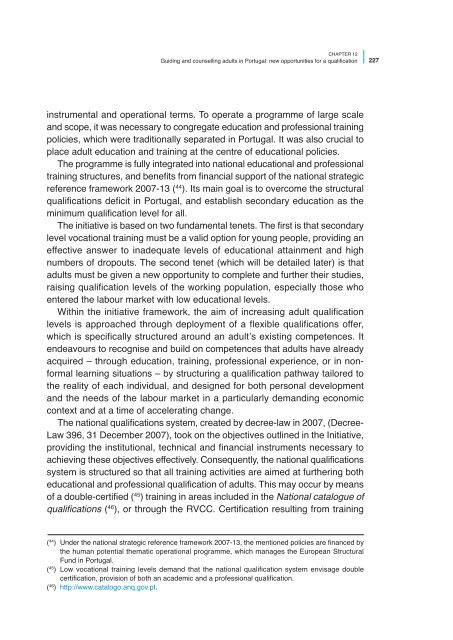Working and ageing - Cedefop - Europa
Working and ageing - Cedefop - Europa
Working and ageing - Cedefop - Europa
Create successful ePaper yourself
Turn your PDF publications into a flip-book with our unique Google optimized e-Paper software.
CHAPTER 12<br />
Guiding <strong>and</strong> counselling adults in Portugal: new opportunities for a qualification 227<br />
instrumental <strong>and</strong> operational terms. To operate a programme of large scale<br />
<strong>and</strong> scope, it was necessary to congregate education <strong>and</strong> professional training<br />
policies, which were traditionally separated in Portugal. It was also crucial to<br />
place adult education <strong>and</strong> training at the centre of educational policies.<br />
The programme is fully integrated into national educational <strong>and</strong> professional<br />
training structures, <strong>and</strong> benefits from financial support of the national strategic<br />
reference framework 2007-13 ( 44 ). Its main goal is to overcome the structural<br />
qualifications deficit in Portugal, <strong>and</strong> establish secondary education as the<br />
minimum qualification level for all.<br />
The initiative is based on two fundamental tenets. The first is that secondary<br />
level vocational training must be a valid option for young people, providing an<br />
effective answer to inadequate levels of educational attainment <strong>and</strong> high<br />
numbers of dropouts. The second tenet (which will be detailed later) is that<br />
adults must be given a new opportunity to complete <strong>and</strong> further their studies,<br />
raising qualification levels of the working population, especially those who<br />
entered the labour market with low educational levels.<br />
Within the initiative framework, the aim of increasing adult qualification<br />
levels is approached through deployment of a flexible qualifications offer,<br />
which is specifically structured around an adultʼs existing competences. It<br />
endeavours to recognise <strong>and</strong> build on competences that adults have already<br />
acquired – through education, training, professional experience, or in nonformal<br />
learning situations – by structuring a qualification pathway tailored to<br />
the reality of each individual, <strong>and</strong> designed for both personal development<br />
<strong>and</strong> the needs of the labour market in a particularly dem<strong>and</strong>ing economic<br />
context <strong>and</strong> at a time of accelerating change.<br />
The national qualifications system, created by decree-law in 2007, (Decree-<br />
Law 396, 31 December 2007), took on the objectives outlined in the Initiative,<br />
providing the institutional, technical <strong>and</strong> financial instruments necessary to<br />
achieving these objectives effectively. Consequently, the national qualifications<br />
system is structured so that all training activities are aimed at furthering both<br />
educational <strong>and</strong> professional qualification of adults. This may occur by means<br />
of a double-certified ( 45 ) training in areas included in the National catalogue of<br />
qualifications ( 46 ), or through the RVCC. Certification resulting from training<br />
( 44 ) Under the national strategic reference framework 2007-13, the mentioned policies are financed by<br />
the human potential thematic operational programme, which manages the European Structural<br />
Fund in Portugal.<br />
( 45 ) Low vocational training levels dem<strong>and</strong> that the national qualification system envisage double<br />
certification, provision of both an academic <strong>and</strong> a professional qualification.<br />
( 46 ) http://www.catalogo.anq.gov.pt.

















